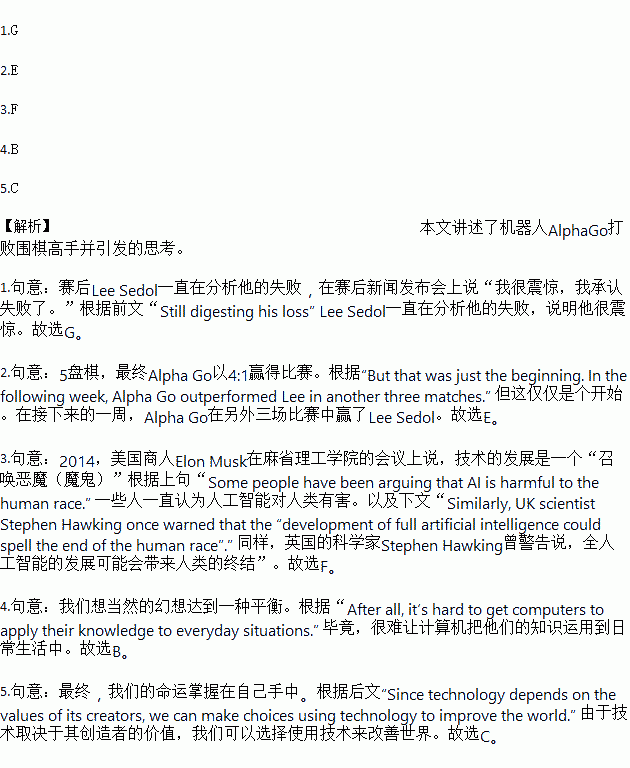题目内容
The ancient Chinese game Go is considered one of the most complicated strategy games. Winning the game was seen as a test of human creativity. That is, until a machine found a way to do it better. Alpha Go, an artificial intelligence (AI) machine built by Google, won its first match against South Korean Lee Sedol on March 9. Still digesting his loss, Lee said during the post-game press conference, “1.”
But that was just the beginning. In the following week, Alpha Go outperformed Lee in another three matches. 2.
Some people have been arguing that AI is harmful to the human race. 3. Similarly, UK scientist Stephen Hawking once warned that the “development of full artificial intelligence could spell the end of the human race”.
So are we really on the verge(边缘)of living in the world shown in the Terminator(终结者)sci-fimovies? “Not quite,” answered The Economist. After all, it’s hard to get computers to apply their knowledge to everyday situations. “4.” Thomas Johnson said, founder of an AI toy company. “But for a robot, to walk up and down hills requires so many complicated decisions to be made in real time, and it’s really difficult to do.”
As The Economist put it: “We have a long way to go before AI’s abilities truly begin to approach the human brain, despite how powerful the technology can be when focusing on a single task.”
Meanwhile, John Mark off of The New York Times argued that researchers should build artificial intelligence that aims for “intelligence augmentation (增加)” (IA) in which computers make people more effective.
He wrote: “5.Since technology depends on the values of its creators, we can make choices using technology to improve the world.”
A. Many robots fell over like little kids learning to walk.
B. We take for granted things like balance and vision.
C. Eventually, our fate is in our own hands.
D. So what is next for AI and humanity?
E. That made the five-match score 4-1 in favor of Alpha Go.
F. In 2014, US businessman Elon Musk said at an MIT conference that developing the technology is calling up a “demon(魔鬼)”.
G. I am in shock; I admit that.
 新思维假期作业暑假吉林大学出版社系列答案
新思维假期作业暑假吉林大学出版社系列答案 蓝天教育暑假优化学习系列答案
蓝天教育暑假优化学习系列答案

 eroes. Herbie is known to play well into the early hours, so don’t expect to get much sleep. This is Herbie’s third visit to Shanghai. The first two were sold out, so get your tickets quickly.
eroes. Herbie is known to play well into the early hours, so don’t expect to get much sleep. This is Herbie’s third visit to Shanghai. The first two were sold out, so get your tickets quickly.